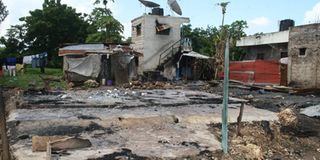Violence stalls efforts by commission to address land problem at the Coast

A view of destruction after the Mpeketoni attack in Lamu County. Plans have stalled to solve the land problem in Lamu, suspected to be at the centre of the violence rocking the county. PHOTO | WILLIAM OERI
What you need to know:
- The National Land Commission wants to resettle the landless but cannot do so due to the violence in which nearly 100 people have died.
- Areas affected have been Mpeketoni, Kibaoni, Maporomoko and Hindi.
- Plans were well underway to then issue titles with a preference to the local peoples to assuage the feeling of marginalisation that has been fuelling strife for years.
Plans have stalled to solve the land problem in Lamu, suspected to be at the centre of the violence rocking the county.
The National Land Commission wants to resettle the landless but cannot do so due to the violence in which nearly 100 people have died.
Gunmen have gone on the rampage in the county since last month, killing people and burning business and residential houses in areas which are mostly occupied by upcountry peoples in attacks that have been claimed by Somali insurgent group Al Shabaab.
The latest attack yesterday morning took place at Pandanguo village where the raiders torched a school and four houses.
The government insists that the attacks are being sponsored and coordinated by what it calls local political networks.
Areas affected have been Mpeketoni, Kibaoni, Maporomoko and Hindi.
According to Dr Samuel Tororei, the land commission was working with local leaders to resolve land cases that have stirred conflict in the area.
Dr Tororei told the Nation that the commission had consulted the county assembly to set up a body to screen land owners and verify ownership.
Plans were well underway to then issue titles with a preference to the local peoples to assuage the feeling of marginalisation that has been fuelling strife for years.
The resettlement schemes many of which had not been completely allocated were to be finalised and all allocations closed.
The commission was also to start new settlement schemes to settle local people in a bid to cool the simmering tensions.
The commission was however grappling with big ranchers in the county.
Many local people have lived on the ranches for years and consider the land their own.
However, the ranchers have obtained titles which they are using to eject the locals from the land.
The fencing of these huge chunks of land has also blocked the grazing corridors for pastoralists.
Dr Tororei said the commission visited Mpeketoni area on June 11, just days before the violence broke out, when they heard complaints from local people over a rancher who had won a case to take over 500 hectares.
“We must be careful on issues about land especially playing politics with land and even how we use courts to solve land cases,” he said.
The locals believe that migrants are targeting land in the area in order to reap big from compensation for the Lamu Port-Southern Sudan-Ethiopia Transport project that the government intends to set up in the area.
They claim that some people in the area have been duped into selling the land for as low as Sh10,000 for land which is speculated to cost millions.
PORT PROJECT
Lamu mainland has become a high value asset especially with the Sh1.4 trillion port project.
The port will be on 750 acres with three bulk cargo berths. There will also be an oil jetty and an international airport.
It is widely expected that residents whose land will be acquired will get plum compensation, an expectation that has spurred land buying and demand.
According to documents from the Lands Ministry, Hindi/Magogoni area which is designated for the port has registered the highest demand by developers in recent years.
A total of 615 plots ranging from two to 10 hectares were sold between 2006 and last year. The amounts paid for the plots are however not indicated.
Within the last decade, a total of 4,213 plots across Lamu were sold to individuals and companies, measuring between one hectare and 4,000 hectares.
The area has also been hit by racketeers who are fraudulently transferring other people’s title deeds into their names and then selling them without the knowledge of the original owners, documents seen by the Nation show.
Most of the fraud is taking place in Hindi/Magogoni Settlement Scheme where half of the cases reported to the National Land Commission originate from.
One of the documents show that 15-acres belonging to Mr Charles Amayi, was fraudulently transferred to another person.
Another 20-acres belonging to Major Jonnes Sirengo, who has since died, was also transferred into the name of a Mr Stephen Kariuki, without the knowledge of Maj Sirengo’s family.
Both Mr Amayi and Rtd Major Sirengo’s widow, Mrs Mary Bakuli, have written to the National Land Commission asking it to investigate.
Dr Tororei said the matter had been brought to their attention and they recommended that the settlement scheme be closed to stop any new allocations until the cases can be resolved.
FAILED TO PAY
He said the matter was complex because in some cases allotment letters issued to allotees were cancelled after they failed to pay while some squatters also found their way into the land.
Mrs Bakuli said in an interview with the Nation that Lands minister Charity Ngilu had assured her that she could be get back her land in two weeks.
“When I went to the ministry of lands they could not trace my files but now that they have been found I believe I can leave my children an inheritance,’’ Ms Bakuli said.
It is suspected the racketeers behind the illegal transfers work with officials at the Lands Ministry.
In another case, National Youth Service Commandant Charles Agoyi, who received 15 acres at the settlement scheme lost his land to unknown people who obtained title deeds without his knowledge.





